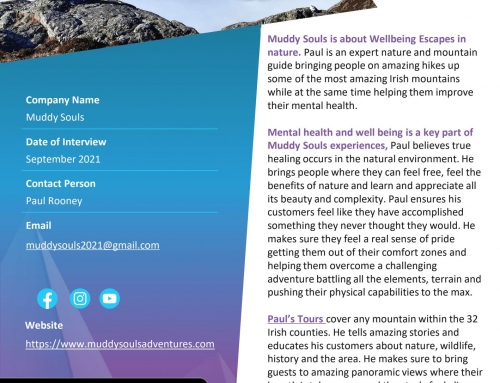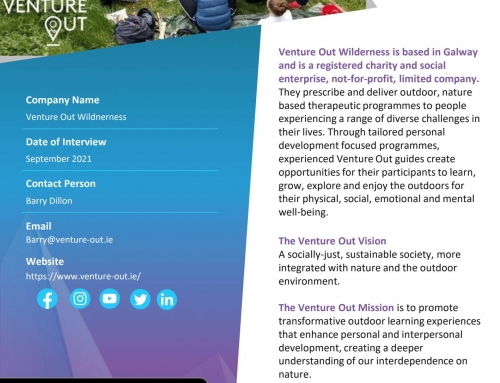Irish PEAK enterprises are dominantly located in or close to rural mountain or upland areas with many dispersed along and around large, medium, and small towns, villages, the coastline and along the open countryside. It is important to recognize the value and diverse opportunities that PEAK enterprises can potentially offer to the rural towns and villages in Ireland they reside. They enable a different innovative approach to business using sustainability and climate-smart initiatives incorporating diversification and digitalization. Their location and environment of course also bring their own set of challenges and opportunities. So what is an Irish SME and how important are they to the potential of rural and mountain areas? In the 2020 report Significance of the SME Sector in the Irish Economy, Irish SMEs (including PEAK SMEs) are firms that employ less than 250 people. Such firms dominate the Irish economic and rural landscape.
‘In overall terms Irish SMEs account for 99.8% of the total number of business enterprises in the private business economy; they employ 1.06 million people, accounting for 68.4% of total employment. The pubs, hotels and restaurants are the backbone of the very economically significant Irish tourism sector. The retailers and other businesses represented account for a very significant component of the grocery and convenience sector. Other industries include services, distribution, building and construction’. (Source)
Comhar SDC (2010) set out a pathway for creating a long-term framework for establishing Green infrastructure and enterprise approaches at the national and local government level in Ireland to improve sustainable development in rural and urban areas in an era of climate change. ‘Green Infrastructure may offer a useful framework to apply to an uplands’ strategy for sustainable land use conservation, management and planning into the future’. (Source)
Irish PEAK businesses are already ambassadors protecting the ecology and biodiversity of Ireland’s mountains and uplands and that managing such resources is vital to future sustainability. Their approaches are in line with future Climate Change measures for Irish policy and strategies. For example, they understand the importance of mountains as both a resource and potential for flooding e.g., almost 82% of Ireland’s drinking water comes from surface water, i.e., rivers and lakes, which in turn have their origin in upland areas and increase in flow during heavy rainfall. PEAK enterprises offer Innovation in storage and redirection initiatives to manage and protect this resource. They understand that their enterprises can be a key preventative or management to climate change and environmental sustainability.

Recreation, Adventure and Tourism Potential
Tourism could be the main sector rural and mountain areas in Ireland rely on. In the context of PEAK tourism, SMEs ESRI states rural tourism (includes mountain tourism) is probably ‘Best defined as tourism that happens in rural areas and includes a wide range of sectors such as food tourism, cultural tourism, agricultural tourism, marine tourism, adventure /activity tourism, and nature-based tourism.….’
Since COVID most mountainous and rural areas have experienced a significant decline in SME activity however they have also experienced a growth in rural and mountain tourism experiences mainly in the form of recreational and adventure activities. These areas are attracting domestic visitors and international tourists searching for safe open natural spaces, with plenty of fresh air and experiences that will enhance their physical and mental wellbeing. Rural SMEs expect this to form the ‘new normal for tourism’ for the next few years at least.
The Irish Sports Monitor (ISM) report found that overall, the number of adults going for recreational walks and outdoor activities rose from 65% in 2019 to 76% in 2021. (Irish Examiner)
‘In Ireland, the value of outdoor recreation and activity tourism from State-owned land alone was an estimated €1.5b in 2014, while every €1m invested in tourism directly supports an estimated 29 tourism jobs, not to mention all the jobs it supports indirectly, so it is a significant sector in terms of income generation and employment creation (Coillte, 2017). This has encouraged the development of new skills and expertise in Ireland, including mountain bike trail construction. In our increasingly urbanized, technologically connected and sedentary society, the attraction of ‘wild’ places and activity tourism that are more characteristic of upland areas is growing. As a result, Comhairle na Tuaithe (the Countryside Council) calls for improved alignment of public funding streams to support large-scale projects with significant potential such as inter-territorial trails (DEHLG, 2013). It also encourages reasonable access to the countryside and responsible use of its resources in ways that respect the rights and responsibilities of landowners and recreational users (See A Profile of Irelands Uplands)
‘Our outdoor amenities – like our hiking trails, cycleways, rivers, forests, and mountains – and the contribution which they make to our physical and mental wellbeing, have never been more appreciated than over the last year. Outdoor recreation is also going to play a valuable role in supporting Ireland’s future recovery as restrictions on movements are relaxed and the tourism sector fully re-opens. A cohesive National Outdoor Recreation Strategy can benefit our economies, while also promoting responsible use of the countryside’. Minister for Rural and Community Development, Heather Humphreys, TD (March 2021)
Focusing on recreation, several government agencies and bodies (Bord na Móna, Coillte, IFI, NPWS and Waterways Ireland) have called for a coordinated and focused investment program into outdoor recreation resourced by a range of government funds to support tourism, rural development and health and wellbeing on public lands in their ‘Outdoor Recreation Plan for Public Lands and Waters in Ireland’ (Coillte, 2017).
Rural Development Program (RDP) included recreation and tourism objectives in the National Countryside Recreation Strategy. The RDP’s Walk Scheme has been in operation for a decade and has been effective in opening up access to private farmland and supporting farmers to maintain trails through their land that form part of National Waymarked Ways, Looped Walking Routes and Heritage Routes.
PEAK enterprises also understand the potential in culture and heritage. Irish mountains and uplands contain some of the best-preserved examples of Irish archaeological heritage, incorporating legends and in some cases extending back thousands of years. PEAK entrepreneurs incorporate sustainable landscape protection, management and planning in their activities is important in maintaining cultural and natural heritage for both current and future generations. MuddySouls operated by young entrepreneur Paul Rooney brings his customers on hikes to Abbey Hill, County Clare where they see the old and famous Corcomroe Abbey and Aillwee Caves.
The Potential of Farming and Other Sectors
PEAK could be the missing link for rural SMEs to prosper and succeed. PEAK SMEs can exist in several economic sectors which rural areas have become reliant upon; food, marine, construction, cultural, adventure and recreation activities, farming, retail, services etc., Farming is another primary sector that dominates rural economies; however, agriculture has steadily declined in recent years mainly due to reduced subsidies, restrictive laws and regulations and lack of funding. PEAK approaches can provide a solution to the future of rural and mountain SMEs by incorporating or adapting to innovative technologies, digital tools, platforms, and sustainable approaches. Some PEAK enterprises are already showing the way such as Howth Conservation for Mountain Goats, Heather Hill Farm, Wellbeing Warrior, Rare Ruminare, and Eweknit (case studies at the bottom of this section)
Agriculture is the primary industry in most rural areas. The agri-food sector is one of Ireland’s most important indigenous manufacturing sectors, accounting for employment of around 167,500 people. (Teagasc)
According to a Vodafone Survey Report, it revealed ‘before COVID Irish SMEs faced significant barriers to success which inhibited their ability to compete with their European counterparts. I was very interested in what firms named as the barriers to adopting digital tools, like selling online and E-invoicing and data analysis,” Mr Kinsella continued. A subsequent survey rolled out during COVID captured data from 500 SMEs across Ireland indicating “Small rural businesses adapted faster and more forcefully than urban businesses did. I was most surprised by the reaction of rural SMEs, and their adoption of digital technologies,” Mr Stephen Kinsella said (Economist). He also said ‘Where those rural companies could access proper broadband and the tools to get themselves online, they were very quick to access new markets. 50% of firms plan to invest specifically in digital skills training and 60% plan to invest in people training in the next two years. There’s a massive market out there, there’s a very different set of skills we need to access that market. And once we have those skills, we are going to do very well.” (Full Article and Report Here)
Examples of Irish PEAK Enterprises
1. Howth Conservation for Mountain Goats
Ground-breaking Conservation Grazing Project
Goats relocated from Mayo to Howth Head where they will be used to reduce gorse cover in landscapes, hills and mountain areas that have been plagued by wildfires. This will create more diverse heathlands in Howth. Melissa Jeuken will tend to the mountain goats using for the first time using the Norweigan ‘no fence’ which employs GPS tracking. (RTE.ie)

2. Heather Hill Farm
Ambassador for Farming for Nature
Cathal Mooney is a regenerative farmer located in Dunkineely, Donegal is close to the famous Slieve League and sits on St Johns Point on Ireland’s coastline. Cathal takes a holistic approach to farming, focusing on ecological, social and economic goals. Heather Hill Farm produce pasture-raised turkey, pasture-raised chicken, pasture-raised eggs, wildflower honey and grass-fed lamb. ‘We believe in employing farming practices that will build the soil, improve habitats and leave the farm stronger and better for the next generation. We use planned mob grazing, integrated tree systems as tools to ensure the soil is as healthy and productive as possible’. https://www.heatherhillfarm.ie/about-the-farm (FFN, www.farmingfornature.ie ) (Read more Donegal Daily)

3. Rare Ruminare
Ambassador for Farming for Nature
Clive raises 100% grass-fed organic beef on his 130-acre farm in Ballymote, Co. Sligo. Upon taking over his family farm in 2003, Clive had two goals in mind, firstly to find a way for his farm to make a profit and secondly to do it without compromising the environment. Clive and his family now take a holistic approach to farming, where livestock production, welfare and ecosystems are all of equal importance. Rare Ruminare website – www.rareruminare.com (Full Article)

4. Venture Out

Social Enterprise Building Resilience Through the Outdoors and Mountain Expeditions
Venture Out is a Wilderness Not for Profit Social Enterprise located in Galway. They deliver their programs and expeditions in the Maumturk Mountains along the western way in Connemara, Galway. They prescribe and deliver outdoor, nature-based therapeutic programmes to people experiencing a range of diverse challenges in their lives. Through tailored personal development focused sessions and programmes, experienced Venture Out guides create opportunities for their participants to learn, grow, explore and enjoy the outdoors for their physical, social, emotional and mental wellbeing. Programs include; Personal Development Wilderness Based Programs, Group & Family Focused Personal Development Programme, Support Intervention & Respite Service, Youth Environmental Leadership Programme, Corporate & Adult Programmes And The Western Region Drug And Alcohol Task Force Funded Expedition. Watch Video Impact Report 2019 – 2020, FAQs





